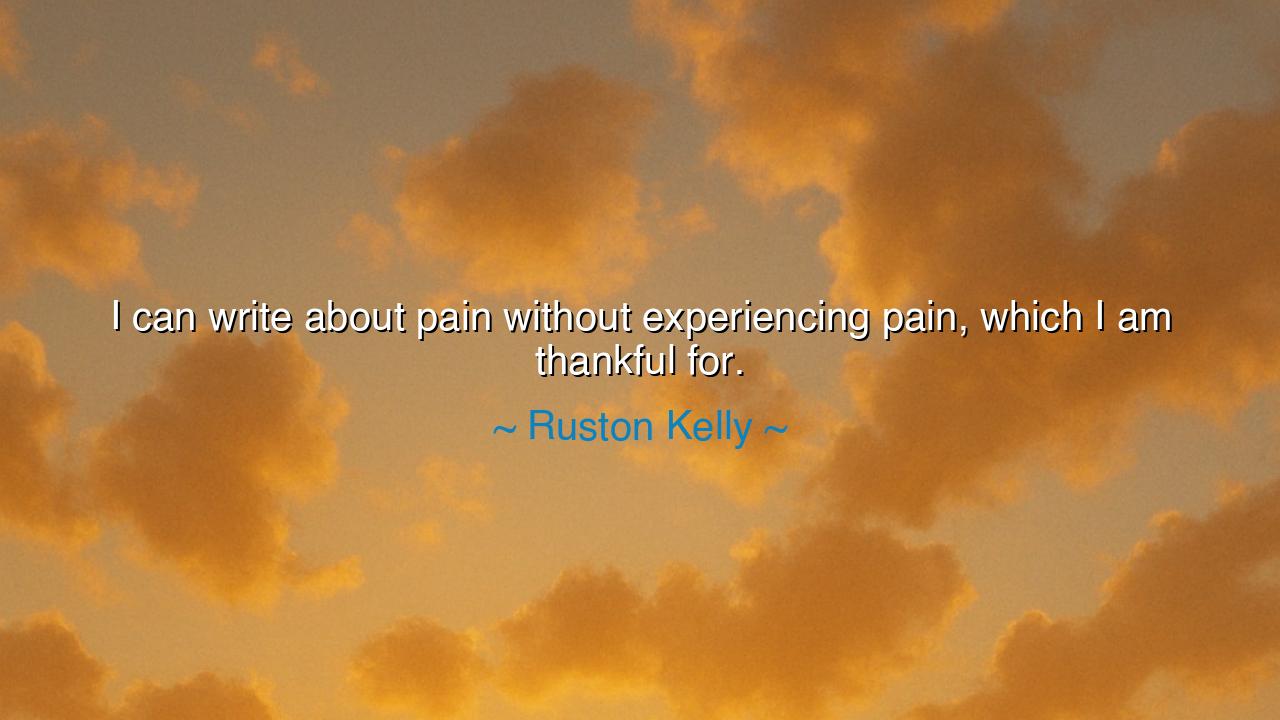
I can write about pain without experiencing pain, which I am






When Ruston Kelly declares, “I can write about pain without experiencing pain, which I am thankful for,” he reveals the rare gift of an artist who can enter the depths of sorrow without being consumed by it. His words teach us that imagination, empathy, and craft can summon truth without the body and soul having to endure its full weight. This is a blessing, for many great creators have been crushed beneath the burdens they sought to express. Kelly’s thankfulness shows that he recognizes the gift of channeling darkness while standing in the light.
The ability to speak of pain without living it in the moment is the mark of a true storyteller. For the artist does not merely record their own life, but touches the universal wounds of humankind. Through empathy, he can feel the echoes of heartbreak, grief, and despair that belong to others, and weave them into words and melodies. In this way, he becomes both healer and messenger. His thankfulness is not pride—it is humility before the gift of expressing what so many feel but cannot speak.
History remembers others who bore this same gift. The poet Virgil, though not himself a soldier, wrote the Aeneid and captured the agonies of exile, war, and longing with such power that generations of warriors found themselves in his lines. Or consider Shakespeare, who in his tragedies spoke with the voice of kings, murderers, and lovers undone by fate, though he had not lived their lives. These masters, like Kelly, show us that art does not always demand personal suffering—it demands the courage to listen deeply to the sorrows of the world and give them form.
There is wisdom in the contrast between experiencing and imagining. To suffer teaches deeply, yes, but to constantly suffer would destroy. The artist who can write of pain without drowning in it has found balance—he is able to walk through shadow without losing sight of the dawn. This balance is rare, for many have believed that to create, one must bleed. But Kelly reminds us that the truest art can come not only from scars but from vision, from empathy, from a heart wide enough to carry the weight of others.
His words also speak to gratitude—gratitude that he can create without self-destruction. Many artists have been consumed by the very darkness they sought to reveal. Musicians and poets alike have often been lost to despair, unable to separate their inner torment from their craft. Kelly, in being thankful, shows an awareness of this danger and a relief that his path allows him to express sorrow without being chained to it. His gratitude is not small—it is the gratitude of survival.
For those who listen, the teaching is clear: you do not need to walk through fire to understand its burn. You may learn from the stories of others, from observation, from the compassion of your heart. Use your imagination to create, rather than waiting for suffering to force creation upon you. And if you do know pain, transmute it, but do not idolize it. For pain is a teacher, but it is not the only one.
So I say to you, seekers of wisdom: be thankful if you can speak of sorrow without being broken by it. Use empathy as your instrument, imagination as your chisel, and compassion as your guide. In this way, like Ruston Kelly, you may craft songs of pain that heal, without letting the wound claim you. And in so doing, you honor both the power of art and the sanctity of life.






AAdministratorAdministrator
Welcome, honored guests. Please leave a comment, we will respond soon